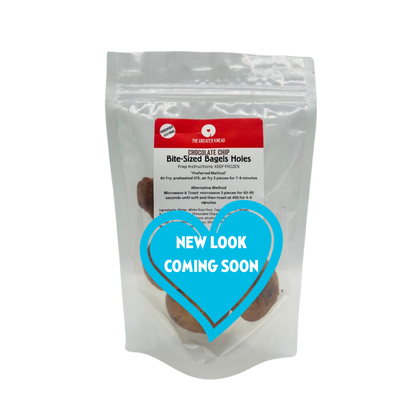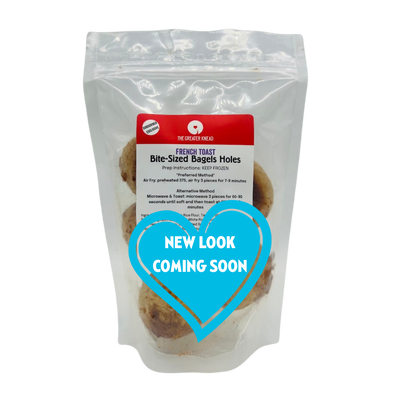
EAT CONFIDENTLY
Here at The Greater Knead, we believe in being transparent and fully open to our customers about how we make our products to ensure that we earn your trust. That is why we included this informative page to help you understand how we declare our products to be Top 9 Allergen-Free and certified Gluten-Free.
About The Greater Knead's facility
The Greater Knead does not use, hold, or store any of the top 9 allergens or any of their derivatives (wheat, soy, dairy, egg, peanut, tree nuts, fish, shellfish and sesame) in our facility. Further, we do not have the newest ninth declared allergen, sesame, in our facility or products as we know that is a growing allergen.
About Our Testing
We know that allergens are a serious, many times life threatening thing, that is why our facility is a dedicated top 9 allergen-free facility. We do our own manufacturing, right in Bensalem PA (outside of Philly) so that we can control everything!
The U.S. Food and Drug Administration (FDA) currently has no minimum thresholds for allergens, meaning if there is any chance an allergen is present in a product, it must be declared on the packaging. By FDA standards, that can include even having an allergenic and a non-allergenic product share the same warehouse. Any contact can lead to potential contamination and we take this very seriously.
We work diligently and educate our staff, to make sure all our products we bake are delicious AND safe for you and your affected friends and family. We have a strict Supplier Control Policy following all local and federal regulations to ensure we are creating safe food. Before we allow a new ingredient or vendor into the facility we have a thorough review of all their processes, in particular their Allergen Control program. When possible we source ingredients that are in dedicated Top 9 Allergen-free facilities, or at a minimum require proof of appropriate cleanout before allowing the ingredient to be used in our products. Once we produce our products we send samples, at least annually, to a third party testing lab for all potential allergens of concern. We test for gluten in house based on our requirements per ingredient and finished products by the GFCO.
When sending to external labs to undergo testing, the labs use ELISA Allergen Test Kits. These test kits take samples of our products and test for trace proteins of allergens. Clinical studies suggest a threshold for most allergens below 5 parts per million (also known as ppm) in foods that are safe for consumption, but ELISA tests have only gotten more accurate as science makes advances in trace protein testing, and test well below that limit.
As an example- An ELISA milk protein test can pick up even .05ppm, or .000005% of a product sample. If your average bag of bagels is 512g, that means that the milk protein being found is about .000000000000128g. That’s less than one crumb!
Know that when we say top 9 allergen-free, we mean it.
Certified Gluten-Free
We are also a gluten-free facility and certify each of our products to be gluten-free through the GFCO.org. We test for gluten in all of our products based on the GFCO standards using the ELISA testing method. Our manufacturing facility remains entirely gluten-free.
More Information
While the Top-9 allergen list was made to cover the most common allergies, we understand that an allergy to items not on that list could still exist and we want to help keep yourself and your family safe. At this time, the only ingredients used and stored in our facility are those listed on our nutritional panels for our different products and flavors. Please feel free to call our office #267.522.8523 with any questions with any of the ingredients we have in our facility.
Food Safety
As an allergen-free manufacturer, we are fully committed to the safety and quality of our products aimed at individuals and families who are hyper-aware of what they’re consuming. We fully support and encourage consumers and retailers to have a higher level of concern about food manufacturing processes.
While all food manufacturers need to be certified through the Department of Agriculture, we didn’t want to settle on just one party’s testing standards. We also consult with a third-party auditing body named Safe Quality Foods Institute, also known as SQFI, to come by yearly and audit our facility according to their rigorous safety code. The SQF Code is updated yearly to work with current FDA regulations, Department of Agriculture standards, and in tandem with the Global Food Safety Initiative (GFSI). We also have our own internal quality monitoring systems that we work with daily when producing.
In complying with these standards, The Greater Knead has in place Good Manufacturing Practices, pest control, strict allergen control, scrupulous cleaning processes, intensive employee training, recall training, and so on to continue to make safe and high quality products. With The Greater Knead, we are always doing the utmost so that you can EAT CONFIDENTLY.
Gluten Free
What is Gluten-Free Food?
From the latin word meaning, “glue,” gluten is a mixture of proteins (prolamins and glutelins) that are in wheat, barley, rye, and other species and hybrids such as spelt, kamut, and einkhorn.Gluten-free food, diets or lifestyles signify that one avoids all products (including all individual ingredients) that would potentially contain these proteins which can cause auto immune reactions and other symptoms. In the United States alone, 30% of the population currently follow a gluten-free diet.
How Do We Test for Gluten?
We rigorously test for gluten in all of our products using the ELISA testing method. The Greater Knead bakery/factory is a gluten-free facility and we certify each of our products to be gluten-free through the GFCO.org. The GFCO gluten threshold is <10 ppm in certified products and their ingredients and we have no concern of cross contamination risk. Our manufacturing facility in Bensalem, PA also remains an entirely gluten-free facility.
Why Go Gluten-Free?
There are certain populations that need to follow a gluten-free diet for health reasons. One reason would be that a person has been diagnosed with celiac disease: An autoimmune disease that causes an immune response when gluten is consumed, that causes damage to the small intestine.A multi-test approach to diagnose is usually performed: First a blood test to see if it suggests celiac disease (you must be consuming gluten at the time of the test), and then a small intestine biopsy to confirm the diagnosis. Another reason would be that if you are not celiac, but experience symptoms of non-celiac gluten sensitivity.This less severe diagnosis causes symptoms such as headaches, brain fog, digestive discomfort, nausea, fatigue, joint pain, and many other symptoms. The only way to see if you have an issue with gluten is to do an elimination diet.



